View from the Hill 14th December 2019
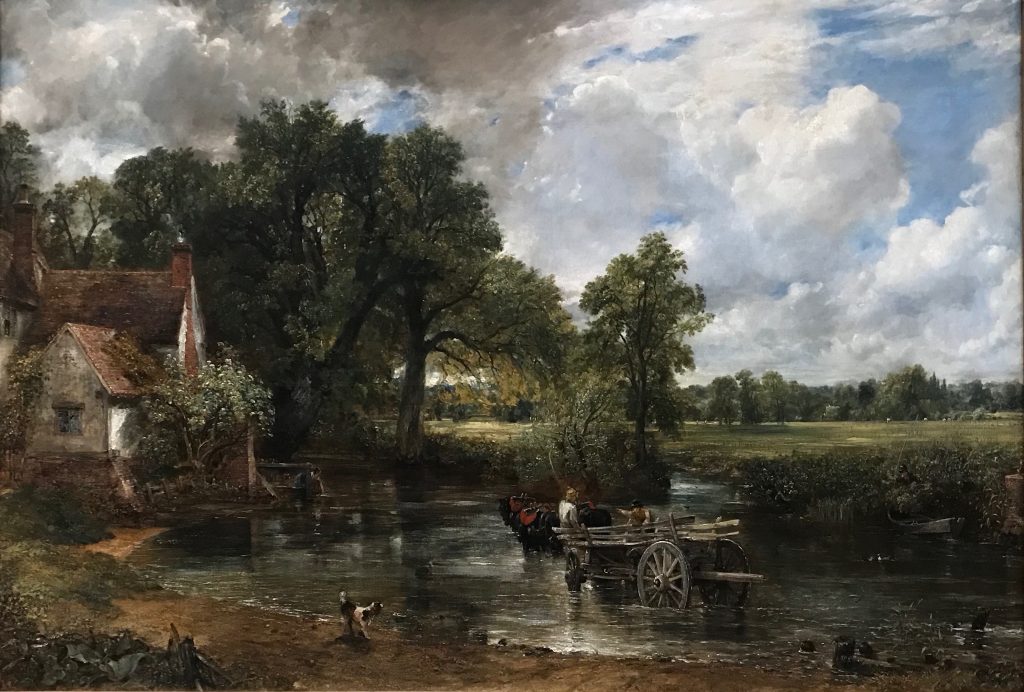
It can be surprisingly cheering to stand in front of a picture like this, The Haywain, by John Constable; the original as it hangs in the National Gallery. It has adorned so many chocolate boxes and biscuit tins over the decades that it is all too easy to walk straight past it. It shares rooms with other classics such as Van Gogh’s Sunflowers and Turner’s Fighting Temeraire, not 20 yards distant. What a treat it was to spend some time exploring these remarkable and famous paintings, and to contemplate the view of this one as it was seen by the artist at the time he painted it in 1821. No noisy engines, no aeroplanes, no Japanese knotweed or Himalayan balsam clogging up the River Stour (the other one, between Suffolk and Essex), there would be Elm trees, turtle doves and a lively background hum of summer insect life.
It was therefore a bit of a lurch to return to a cold Dorset where incessant rain had given way to frost, we didn’t even have time to empty the rain gauge from the previous day, before the temperature plummeted and froze the water by morning.
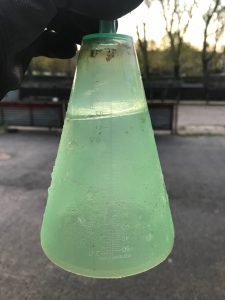
It was with great relief that we completed our autumn sowing campaign, on Nov 19th, the latest any of us can remember, nearly all the wheat and barley has emerged now, but so late in the year, meaning its root system will not have reached as far as in a normal year, making it more vulnerable to extreme weather in the coming growing season.
Some of our seedbeds were much wetter than we would dream of drilling into in a normal year, but this hasn’t been a normal year, so we have pushed the boundaries. It is a huge relief to find wheat emerging in even the wettest fields and looking quite respectable, though whether we will ever get a chance to roll in the stones in the stoniest fields remains to be seen. Our agronomist tells us to expect yields to be considerably less than average next harvest.
The drill has ended up in a bit of a muddy mess.
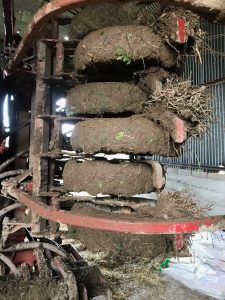
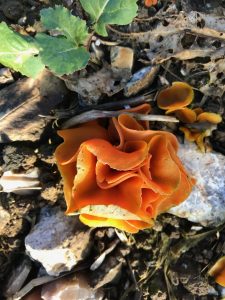
Walking through one of the rape fields we found this peculiar fungus, and were pleased to be distracted by it from the unfolding bad news in the rape crop. The flea beetles have done as promised, laying eggs on the leaves, which have now hatched into tiny larvae and are burrowing their way down to the main stem, where they like to hollow out the plant from the inside. This doesn’t necessarily kill the plant, which will compensate by sending up new branches in the spring. Sadly though it will not have the yield potential of a nice clean neonicotinoid treated crop such as we used to grow, and which is still legal to be used elsewhere in the world. Supposedly banned in Europe, these over-powerful insecticidal seed treatments stopped the flea beetle in its tracks, but were sadly so potent that they remained in the plant and even reached the nectar in the flowers by the following spring, and could be detected in bees. Word has it that the Polish government has granted its farmers a derogation to be able to use these seed treatments, which is stealing a march on its law abiding fellow EU members.
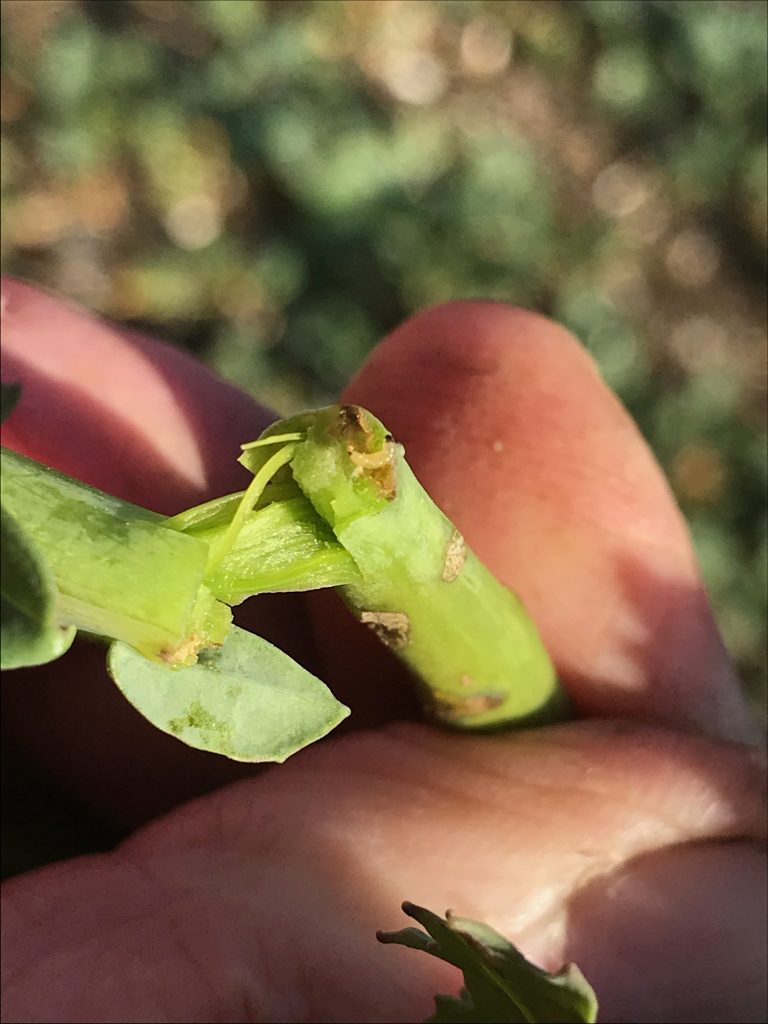
UK farmers are very vulnerable to competition from foreign countries whose farmers still use chemicals which are illegal in Europe, and who may, under world trade organisation rules post Brexit, be able to undercut us with their products which are consequently cheaper to produce.
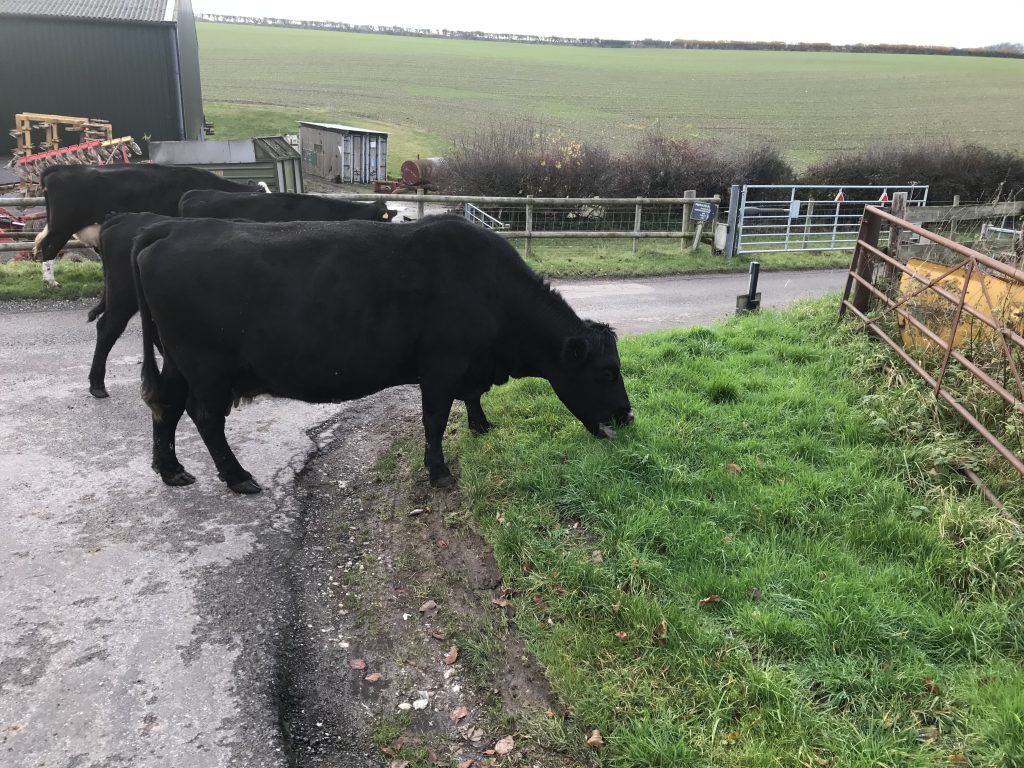
The wet weather has finally made us give up any attempt to keep the cows outside any longer. We always try to hold off as long as possible to save precious fodder and straw, but the grass has stopped growing so last week it was time to walk them across the farm to their winter quarters at Shepherds Corner. The ground being so wet their heavy hooves have made a fine mess of our formerly pristine verges along the way. Some timely rolling will need to be done in the spring to put this right. Before housing the cows were separated from their now 9 month old calves, so the first night was a bit noisy, there was a lot of mooing.
As I write this we are just 5 days away from the general election. I have never dreaded the result of an election more in my entire life. Friday morning will reveal our likely direction of travel, which for the last 3 ½ years as farmers has been more uncertain that at any time before. We will either end up outside of the EU with the scary prospect of trade deals with dodgy countries, exposed to WTO rules ,and the vagaries of our national government’s policies for agriculture and the environment. Or we may ultimately remain inside the EU, with its thoroughly unsatisfactory Common Agricultural Policy, which has done no favours to the environment, but at least we would have a fair market for our produce, and if we re-engage with the EU perhaps we can bring to bear some positive influence to improve it.
After the rather controversial film about meat and the planet on BBC TV a few weeks ago, it may be a bit risky to show this picture, however it can be used to discuss a few important issues.
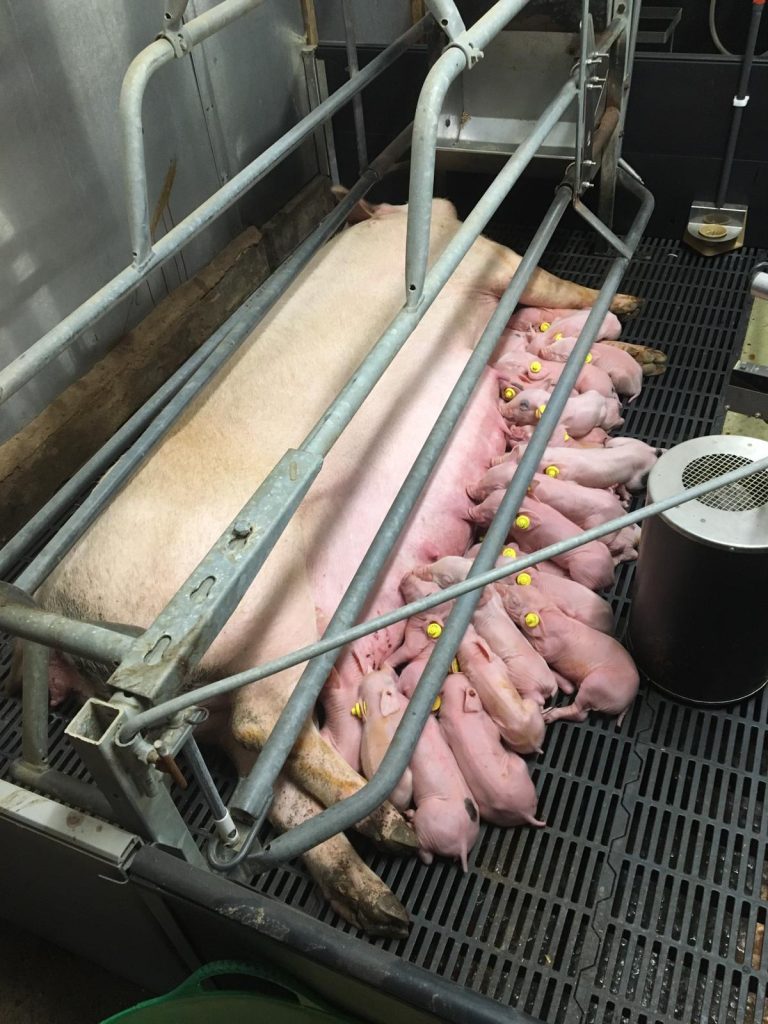
It shows a sow on a farm in the UK lying in a farrowing pen, with her record breaking 27 piglets. This may look cruel, but actually saves very many piglets lives. Consider the size of the sow, and the size of the piglets, if they were in a simple pen, many of the piglets would be squashed by their mother.
In the UK, indoor pig farms are allowed to use a farrowing crate until the piglets are weaned, but then the sow must return to a yard with other sows. In other countries around the world sows may be kept in stalls or crates all year round. This makes them much cheaper to keep, no bedding is needed, and fewer buildings.
One easy way to ensure high productivity is to use farrowing crates, another is to keep fattening pigs in pens on slats where the manure falls through into a reservoir below the pens, and no bedding is used.
Outdoor systems, generally considered to be higher welfare than indoor systems, are more common in the UK than anywhere else in the world, but they have higher production costs, because mortality rates are higher, the animals are given straw bedding, and sows have to use up a lot more of the energy in their feed to keep warm, than they would in a nice warm barn.
These factors demonstrate the importance of making sure that there is a level playing field in the future. If pigmeat is imported into the UK from countries using cheaper rearing systems, our farmers will be undercut, and will go out of business, then we will completely lose control of the welfare of the animals we consume.
The TV programme I referred to mostly used footage from foreign farming systems, bearing little relation to UK systems. The presenter seemed to have a bit of an agenda before she started, but here and there she had a point. Most of the farming systems shown were not a good advertisement for meat eating. It is down to all of us to understand the provenance of what we eat, where it comes from and how it was produced. If we don’t approve then we need to convey that message with our purchasing patterns. Farmers will react to the market, as they always do, and if we have to learn to grow lentils, chickpeas, and vegetables, instead of grass and grain to feed to animals, then we will do it, if the climate will allow it. Please don’t ignore animal welfare, UK standards are amongst the highest in the world, we have set high standards, at a considerable cost. If we just buy the cheapest from abroad produced in cruel systems, we undermine all that progress.
There is a huge discussion to be had regarding animals, manure, mixed farming, soil health, pasture fed meat and carbon capture from the atmosphere, but I will leave that for another day.
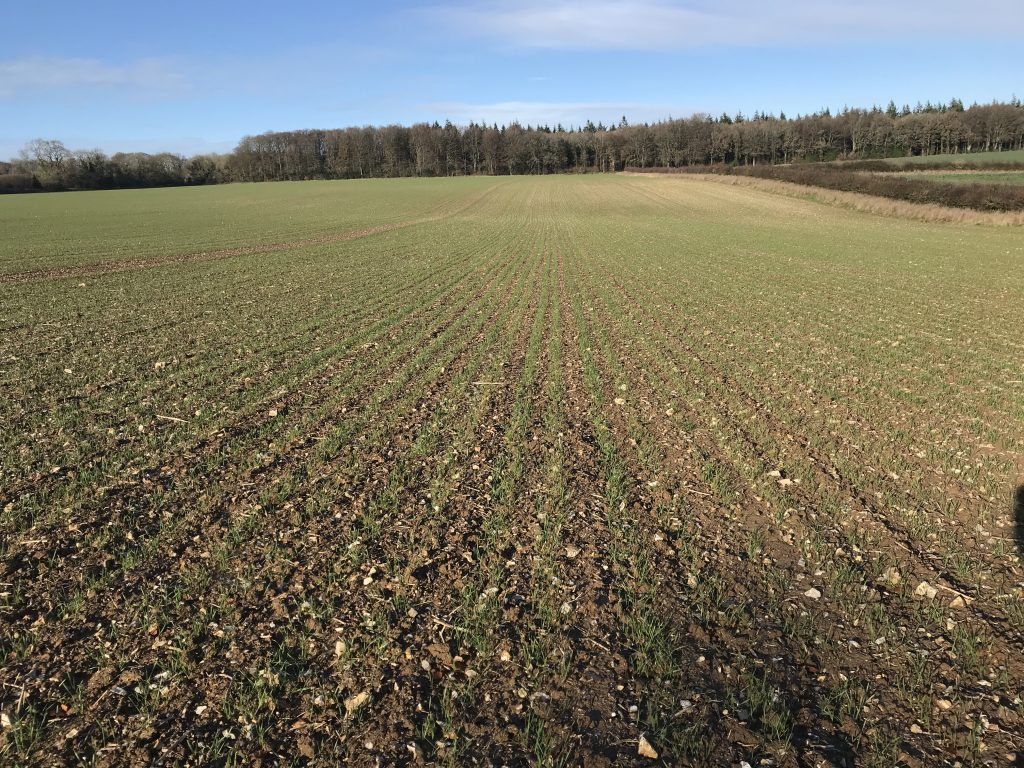
Emerging wheat after the wettest autumn in very many years.
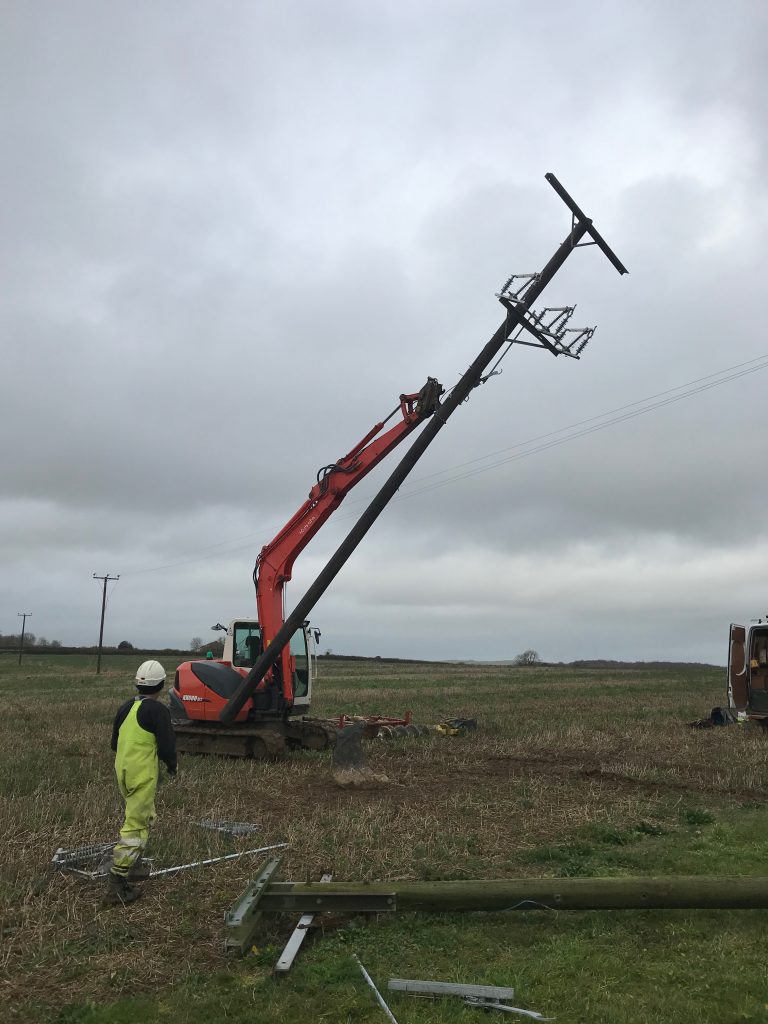
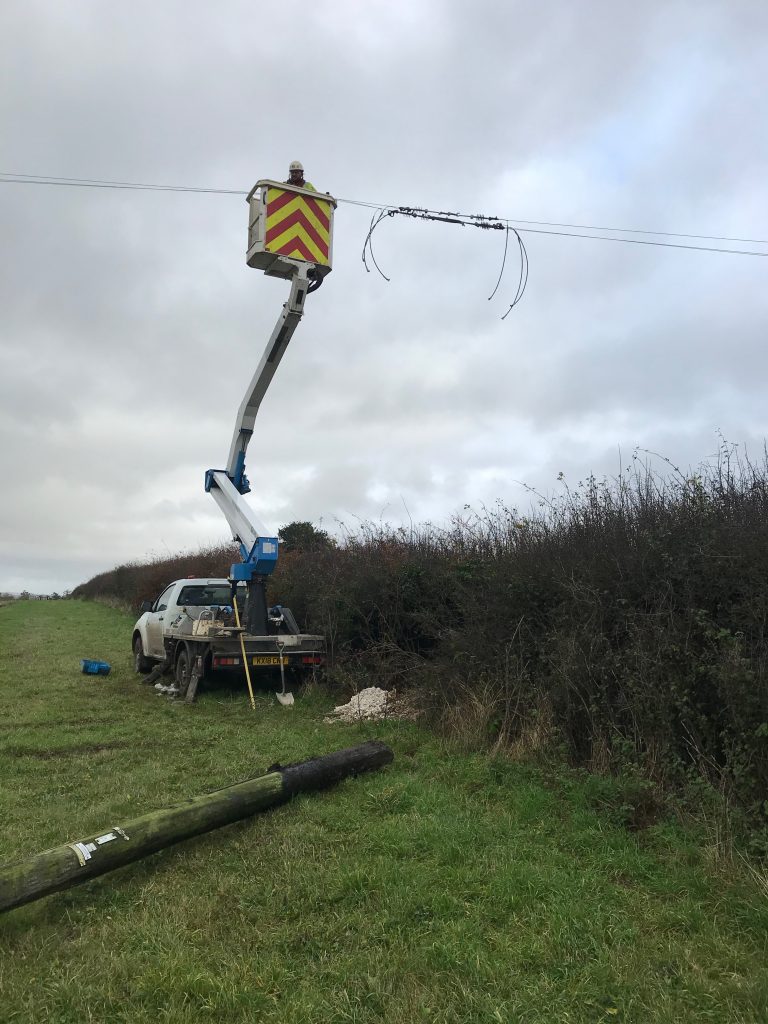
A team of engineers have been replacing electricity pylons in the very wet autumn, making a bit of a mess, but not as bad as if it were in summer time in standing crops. Luckily these fields are destined for spring crops.

I wish more of the public could read your comments on ethical food production against cheap and harmful Farming practices. I see no articles from the NFU settting out the scenario of cheap food grown without thought for the animal welfare and the use of banned chemicals coming in to the UK
Jim